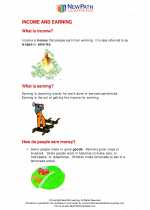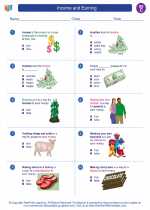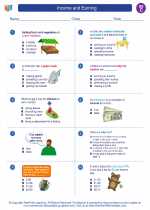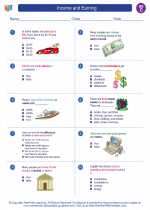Employment
Employment refers to the condition in which a person performs work in exchange for payment. It is a crucial aspect of society, as it provides individuals with financial stability and contributes to the overall economy.
Types of Employment
There are various types of employment, including:
- Full-time Employment: Working a standard number of hours per week, typically 35-40 hours, and receiving benefits such as health insurance and paid time off.
- Part-time Employment: Working fewer hours than a full-time employee, often without the same benefits.
- Temporary Employment: Working for a fixed period of time, often to cover for another employee's absence or to complete a specific project.
- Self-Employment: Owning and operating one's own business or freelance work.
Importance of Employment
Employment plays a vital role in society for several reasons:
- It provides individuals with income to support themselves and their families.
- Employment contributes to economic growth and stability by creating goods and providing services.
- It offers opportunities for personal and professional development through skill-building and experience.
- Employment fosters a sense of purpose and fulfillment for individuals as they contribute to society.
Factors Affecting Employment
Several factors influence employment, including:
- Economic Conditions: Economic downturns can lead to job losses, while periods of growth can create employment opportunities.
- Technological Advancements: Automation and technological innovation can impact the types of jobs available and the skills required.
- Education and Training: Access to education and training programs can affect an individual's ability to secure employment.
- Government Policies: Laws and regulations related to labor, trade, and taxation can influence employment trends.
Study Guide
Here are some key points to remember about employment:
- What is employment?
- What are the different types of employment?
- Why is employment important in society?
- What factors can impact employment?
Understanding the concept of employment and its significance in society is essential for comprehending the dynamics of the workforce and the economy.
.◂Social Studies Worksheets and Study Guides Third Grade. Income and Earning
Study Guide Income and Earning
Income and Earning  Worksheet/Answer key
Worksheet/Answer key Income and Earning
Income and Earning  Worksheet/Answer key
Worksheet/Answer key Income and Earning
Income and Earning  Worksheet/Answer key
Worksheet/Answer key Income and Earning
Income and Earning 

 Worksheet/Answer key
Worksheet/Answer key
 Worksheet/Answer key
Worksheet/Answer key
 Worksheet/Answer key
Worksheet/Answer key

The resources above cover the following skills:
National Curriculum Standards for Social Studies (NCSS)
PRODUCTION, DISTRIBUTION, AND CONSUMPTION
SOCIAL STUDIES PROGRAMS SHOULD INCLUDE EXPERIENCES THAT PROVIDE FOR THE STUDY OF HOW PEOPLE ORGANIZE FOR THE PRODUCTION, DISTRIBUTION, AND CONSUMPTION OF GOODS AND SERVICES.
KNOWLEDGE - Learners will understand:
The difference between needs and wants.
The characteristics and functions of money and its uses.
PROCESSES - Learners will be able to:
Analyze the differences between wants and needs.
GLOBAL CONNECTIONS
SOCIAL STUDIES PROGRAMS SHOULD INCLUDE EXPERIENCES THAT PROVIDE FOR THE STUDY OF GLOBAL CONNECTIONS AND INTERDEPENDENCE.
KNOWLEDGE - Learners will understand:
All cultures have similar needs, but meet those needs in different ways that may influence or be influenced by global connections.
PROCESSES - Learners will be able to:
Identify and examine how wants and needs of people in one part of the world may conflict with the wants and needs of people in other parts of the world.
National Standards for Civics and Government (NSCG)
What is Government and What Should It Do? What are the purposes of rules and laws?
Purposes of rules and laws: Students should be able to explain the purposes of rules and laws and why they are important in their classroom, school, community, state, and nation. To achieve this standard, students should be able to explain that rules and laws can be used to
Describe ways people should behave, e.g., attend school and do homework, raise one’s hand and be recognized before speaking in class, respect other peoples’ privacy and property
Assign burdens or responsibilities, e.g., laws that require people to pay taxes or to perform military service in times of national emergency
How Does the Government Established by the Constitution Embody the Purposes, Values, and Principles of American Democracy? What are the major responsibilities of state governments?
Organization and major responsibilities of state governments: Students should be able to explain the most important responsibilities of their state government. To achieve this standard, students should be able to
Explain how state government services are paid for, e.g., taxes on sales and on individual and business income, fees for using parks and toll roads, license fees
How Does the Government Established by the Constitution Embody the Purposes, Values, and Principles of American Democracy? What are the major responsibilities of local governments?
Organization and major responsibilities of local governments: Students should be able to explain the most important responsibilities of their local government. To achieve this standard, students should be able to
Explain how local government services are paid for e.g., property, sales, and other taxes; money from state and national governments
National Content Standards in Economics (NCSE)
Scarcity
Students will understand that productive resources are limited. Therefore, people cannot have all the goods and services they want; as a result, they must choose some things and give up others. Students will be able to use this knowledge to identify what they gain and what they give up when they make choices.
At the completion of Grade 4, students will know that:
People make choices because they can’t have everything they want.
Economic wants are desires that can be satisfied by consuming a good (an object), a service (an action), or a leisure activity.
At the completion of Grade 4, students will use this knowledge to:
Match a list of wants with the correct example of a good, service or leisure activity that satisfies each want.
Institutions
Students will understand that institutions evolve and are created to help individuals and groups accomplish their goals. Banks, labor unions, markets, corporations, legal systems, and not-for-profit organizations are examples of important institutions. A different kind of institution, clearly defined and enforced property rights, is essential to a market economy. Students will be able to use this knowledge to describe the roles of various economic institutions and explain the importance of property rights in a market economy.
At the completion of Grade 4, students will know that:
Saving is the part of income not spent on taxes or consumption.
At the completion of Grade 4, students will use this knowledge to:
Explain the relationship between saving money and earning interest and borrowing money and paying interest, after participating in an activity in which they role play savers and borrowers.
At the completion of Grade 4, students will use this knowledge to:
Plan a budget for an allowance. The budget will include spending for goods and services, charitable donations, sales taxes, and saving.
Income
Students will understand that income for most people is determined by the market value of the productive resources they sell. What workers earn primarily depends on the market value of what they produce. Students will be able to use this knowledge to predict future earnings based on their current plans for education, training, and career options.
At the completion of Grade 4, students will know that:
People can earn income by exchanging the use of their labor (physical or mental work) for wages or salaries.
At the completion of Grade 4, students will use this knowledge to:
Collect data from adults regarding their reasons for working, analyze the data, and generalize about why people work.
Role of Government and Market Failure
Students will understand that there is an economic role for government in a market economy whenever the benefits of a government policy outweigh its costs. Governments often provide for national defense, address environmental concerns, define and protect property rights, and attempt to make markets more competitive. Most government policies also have direct or indirect effects on people’s incomes. Students will be able to use this knowledge to identify and evaluate the benefits and costs of alternative public policies, and assess who enjoys the benefits and who bears the costs.
At the completion of Grade 4, students will know that:
Governments pay for the goods and services they use or provide by taxing or borrowing.